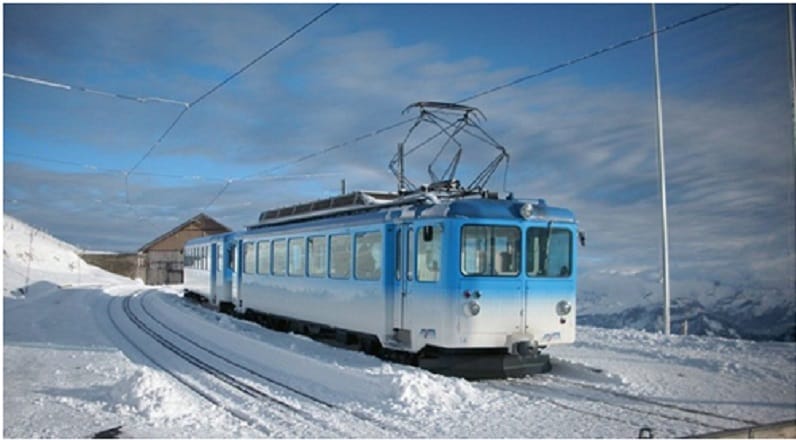Chronology of a death
Eight months after the Rigi accident involving a Korean tourist, the tragedy is still a matter of concern. No legal consequences are to be expected for the mountain railway involved, but the issue must nevertheless be dealt with.

How did the company react to the accident, how did it communicate and how will it proceed in the future? Stefan Otz was Managing Director of Rigi Bahnen AG at the time and can now put what happened into perspective. It involved a Korean tour group with eight elderly couples and a young Korean companion. The group was on a tour of Europe and visited Rigi Kulm; a standard excursion without local support.
Rigi was shrouded in fog on 16 November 2018. After arriving at Rigi Kulm, the Korean guide explained to his guests that they now had one hour to experience the asphalt path back to Rigi Staffel on their own. The individual tour members hardly knew each other and so everyone walked at their own pace to Staffel, where they and the guide arrived later. It was only there that the guide and his wife discovered that one person was missing. They immediately informed the station manager, but it was already clear here that no one spoke English on the part of the Asians.
Accident
It is still unclear exactly how the missing person got away from his group. Whether he rested on a bench somewhere or took photos; at some point he probably got lost. It is ultimately pointless to discuss whether he then deliberately followed the tracks or simply because he could find no other way. The sad fact is that at that time a normally running train was heading uphill. The driver sits at the rear of the train and an attendant stands at the front, facing uphill with a view of the tracks. Although the train was travelling at no more than 20 km/h, in dense fog with a visual contact of easily five metres, there was simply not enough time to recognise a person running on the track. Stefan Otz explains: "Too many seconds passed before the train attendant was able to trigger a warning that prompted the train driver to make an emergency stop. The tourist was hit directly on the track and unfortunately died on the spot."
The tourists travelling uphill did not notice anything about the accident; they were asked to change to a following train "due to technical problems". The two railway employees remained at the scene of the accident; for the time being, they were not allowed to move the train composition involved; it was, after all, a crime scene, and the authorities had to investigate it for involuntary manslaughter.
Immediate measures
Otz recalls: "Ironically, we met that Friday to discuss crisis management and how to proceed in the event of an emergency. The Executive Board and the Chairman of the Board of Directors were present, so we were able to set up a command office right on the spot in Vitznau. I stayed there while another member of the Executive Board drove to the accident site."
As a first measure, the Korean group was brought to Vitz nau, although they had not yet been informed of the accident at that time. They were taken to a hotel, a room was made available and catering was organised. However, and this is the tragedy, there was no communication with these people. Because from the Swiss side no one spoke Korean and from the tour group no one understood English. Information about a death could not and would not be communicated by means of sign language.
Meanwhile, police and REGA arrived on the mountain, but it took hours before death was officially established and the body could be transported to Schwyz hospital.
Endless waiting
Meanwhile, it was getting to be early evening and the group was still waiting in their hotel. Not a good moment, Stefan Otz recalls: "We just couldn't talk and there is no Korean-speaking person in Vitznau who could have helped us. We have a Korean part-time employee, but he was travelling in the canton of Zurich that day. When we finally reached him, we asked him to come immediately. At the same time we contacted the consulate in Bern and were able to persuade a staff member there to travel to Vitznau immediately. Unfortunately, it took several hours until we, together with a police representative and Swiss-Koreans who had arrived, were able to form the group. We decided to inform everyone at the same time, i.e. the wife learned of her husband's death together with everyone else. The immediate reactions were correspondingly strong; with pain and anger and all kinds of reproaches."
While the wife remained in Vitznau, the group decided to continue their journey to Milan. The next day, the body was taken to the Forensic Institute of the University Hospital in Zurich, where all the necessary papers for the journey home were prepared.
Intercultural problems
What is striking is the very banal problem of the lack of language skills and the fact that it took hours to establish communication with the tourists concerned. This should no longer happen in today's virtual age. For example, airport authorities are repeatedly confronted with tourists whose language they do not speak. Then they talk by means of a telephone conference and the support of an external interpreter.
Hotspots in international tourism, such as the Rigi, should be prepared to talk directly to visitors from the most important source markets. It doesn't have to be a death. Even a simple broken leg requires immediate communication (name, pain, hotel, relatives, etc.).
The accident site itself was cleaned up after the police cleared it without any markings; there was not even a bouquet of flowers. When the wife wanted to visit the death site the next day, it could not even be clearly identified. But this is not a cultural problem either, because even local relatives would want to visit a death site.
Communication
While the group was still waiting for information, the Schwyz canal police had already gone to the media. Correctly, the management has recorded key values on which the external communication should be based: Firstly, the group was travelling independently within the framework of a normal touristic operational procedure. Second, the deceased was not walking with the group, but should not have been lost because the footpath is of good quality. Third, the accident occurred in an open and very steep terrain. And moreover, on the tracks, which are ultimately forbidden to walk on anywhere in the world. It was a tragic accident, but entirely due to one's own fault.
However, it is incomprehensible that the police went to the media at a time when the wife did not yet know anything. This could have had dire consequences if, for example, acquaintances who happened to read a newsflash about a death in Switzerland had passed on the news to their travelling friends. Since this was an individual case and not a major accident on the motorway, it would have been necessary to wait until the wife was informed before publishing the news.
In the market
According to Stefan Otz, this went well: "With the help of our representative in Seoul, we were able to communicate proactively. The news quickly made the rounds in the media, but disappeared just as quickly. The Korean travel industry took note of this fatality, but the seemingly clear constellation of the self-inflicted accident did not cause the matter to explode." At least, on a private law basis, the case is still pending as of today, as the relatives have sued their Korean travel agency. The possibility that this could have legal repercussions for Rigi Bahnen AG cannot be ruled out entirely, but as things stand today it is hardly conceivable.
Conclusion
In the debriefing of the mountain railway it is stated that it was an accident due to self-infliction, but that one should have reacted faster. The fact that it took around five hours to form the group is ultimately unacceptable. There will have to be digital bes ser on the way. In the meantime, the management has worked out a concept that allows simultaneous interpreters of the relevant foreign languages (Chinese, Korean, etc.) to be available within an hour.
However, the protection of the person concerned must also be corrected. The wife should never have been informed before the group, and this is not a cultural problem. In Switzerland, too, the persons directly affected would be addressed in advance and separately.
Overall, however, credit must be given to those responsible for the best possible operational handling of the accident and also for the fact that communication to the public, for example in a TeleZüri interview, was focused and calm. Accordingly, the topic disappeared from the media within a few days.









